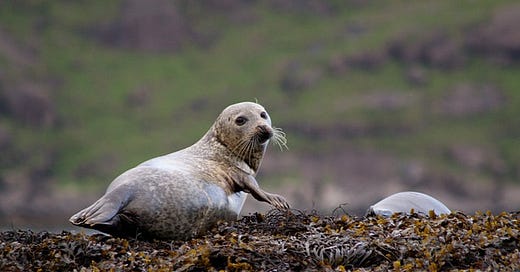Creating the Webbd Wheel: Selchie
In which we long for what we're made of ...
A selchie is a mystical creature which is a human on land and a seal in the sea. Stories about selchie come to us from the Hebrides, Iceland, Scotland, Ireland, Orkney, and the Faroe and Shetland islands. I was first introduced to selchies as a child through a picture book by Jane Yolen, a wonderful storyteller. As a storyteller, selchie tales were among my favorites. I rarely told one without fighting back tears.
All selchie stories are about exile. Most of the tales speak of a female selchie whose skin is stolen by a lonely fisherman who begs her to stay with him, promising one day to return her skin. In time, children are born and the selchie resigns herself to life on land, but one day the skin is found, often by one of the children, and the selchie must make a terrible choice between her human family and her life in the sea.
Many fairy tales are about exile, exile from home, from family, from position and power. Sadly, we often exile ourselves from some part of our true nature out of fear of what others will think or say if we’re honest about who we are.
The poignancy of selchie stories lies in the choice at the heart of exile: do we amputate parts of ourselves for the sake of others and our love for them, or do we forever leave others in order to be entirely true to ourselves?
I’m suspicious of black-and-white choices. It seems to me life should accommodate living authentically and keeping our relationships happy and healthy. However, I know from my own experience sometimes that’s impossible. Sometimes it really is a choice between living true to ourselves or being the person others want us to be.
In the old stories, the selchie’s cry, “I want what I am made of,” tears at my heart. We all want what we’re made of. We all feel the deep, endless call of our own nature. And yet we have a tribe, a culture, a framework of expectations and traditions we’re expected to fit into, and if we fail to do so we become outcast, exiled.
But we continue to long for what we’re made of, and the conflict can and does tear us apart. Denying what we’re made of is equally painful and destructive. Living inauthentically brings only unhappiness to ourselves and those around us, but authenticity costs a great deal in courage and strength, and may ultimately result in annihilating loss.
This aspect of the human condition is as old as we are, and most of us must come to terms with it in some way during our lifetimes. I believe that’s why stories like the selchie tales survive, and why they are so moving.
Another facet of selchie stories has to do with intentionally subjugating another. To steal the skin of a selchie, no matter how great the loneliness and desperation leading to such an act, is not love. Far too often, we equate love with obedience to the expectations of others. Far too often, we’re convinced we must make ourselves small and be imprisoned for love’s sake. Any person who deliberately and systematically steals our power is not loving us, no matter what they say.
A selchie, after years of family life, may feel compassion for her fisherman, but can never trust the one who stole her skin. When her skin is returned, she knows she must not put herself in his power again. Yet if she returns to what she’s made of, she must leave her children.
Sometimes regaining our stolen power, our stolen selves, is a Pyrrhic victory.
(Published with post #20 of The Hanged Man.)



